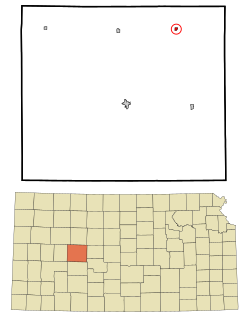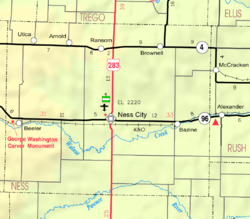Brownell is a city in Ness County, Kansas, United States.[1] As of the 2020 census, the population of the city was 23.[3]
Brownell, Kansas | |
|---|---|
 Location within Ness County and Kansas | |
 | |
| Coordinates: 38°38′26″N 99°44′39″W / 38.64056°N 99.74417°W[1] | |
| Country | United States |
| State | Kansas |
| County | Ness |
| Founded | 1880s |
| Incorporated | 1927 |
| Named for | Mr. Brownell |
| Area | |
• Total | 0.20 sq mi (0.51 km2) |
| • Land | 0.20 sq mi (0.51 km2) |
| • Water | 0.00 sq mi (0.00 km2) |
| Elevation | 2,425 ft (739 m) |
| Population | |
• Total | 23 |
| • Density | 120/sq mi (45/km2) |
| Time zone | UTC-6 (CST) |
| • Summer (DST) | UTC-5 (CDT) |
| ZIP code | 67521 |
| Area code | 785 |
| FIPS code | 20-08675 |
| GNIS ID | 2393437[1] |
History
editBrownell was a station on the Missouri Pacific Railroad.[4] The community was named for Mr. Brownell, a railroad official.[5]
The first post office in Brownell was established in 1880, but the post office was called Vansburgh until 1888.[6]
Geography
editAccording to the United States Census Bureau, the city has a total area of 0.20 square miles (0.52 km2), all land.[7]
Climate
editThe climate in this area is characterized by hot, humid summers and generally mild to cool winters. According to the Köppen Climate Classification system, Brownell has a humid subtropical climate, abbreviated "Cfa" on climate maps.[8]
Demographics
edit| Census | Pop. | Note | %± |
|---|---|---|---|
| 1930 | 207 | — | |
| 1940 | 162 | −21.7% | |
| 1950 | 211 | 30.2% | |
| 1960 | 118 | −44.1% | |
| 1970 | 98 | −16.9% | |
| 1980 | 92 | −6.1% | |
| 1990 | 44 | −52.2% | |
| 2000 | 48 | 9.1% | |
| 2010 | 29 | −39.6% | |
| 2020 | 23 | −20.7% | |
| U.S. Decennial Census | |||
2020 census
editThe 2020 United States census counted 23 people, 18 households, and 11 families in Brownell.[9][10] The population density was 116.2 per square mile (44.9/km2). There were 27 housing units at an average density of 136.4 per square mile (52.7/km2).[10][11] The racial makeup was 82.61% (19) white or European American (82.61% non-Hispanic white), 0.0% (0) black or African-American, 0.0% (0) Native American or Alaska Native, 0.0% (0) Asian, 0.0% (0) Pacific Islander or Native Hawaiian, 0.0% (0) from other races, and 17.39% (4) from two or more races.[12] Hispanic or Latino of any race was 4.35% (1) of the population.[13]
Of the 18 households, 38.9% had children under the age of 18; 44.4% were married couples living together; 33.3% had a female householder with no spouse or partner present. 27.8% of households consisted of individuals and 22.2% had someone living alone who was 65 years of age or older.[10] The average household size was 2.8 and the average family size was 2.7.[14]
8.7% of the population was under the age of 18, 13.0% from 18 to 24, 8.7% from 25 to 44, 30.4% from 45 to 64, and 39.1% who were 65 years of age or older. The median age was 56.5 years. For every 100 females, there were 76.9 males.[10] For every 100 females ages 18 and older, there were 75.0 males.[10]
2010 census
editAs of the census[15] of 2010, there were 29 people, 16 households, and 8 families residing in the city. The population density was 145.0 inhabitants per square mile (56.0/km2). There were 38 housing units at an average density of 190.0 per square mile (73.4/km2). The racial makeup of the city was 100.0% White.
There were 16 households, of which 12.5% had children under the age of 18 living with them, 50.0% were married couples living together, and 50.0% were non-families. 50.0% of all households were made up of individuals, and 18.8% had someone living alone who was 65 years of age or older. The average household size was 1.81 and the average family size was 2.63.
The median age in the city was 59.5 years. 17.2% of residents were under the age of 18; 0.0% were between the ages of 18 and 24; 10.3% were from 25 to 44; 37.8% were from 45 to 64; and 34.5% were 65 years of age or older. The gender makeup of the city was 58.6% male and 41.4% female.
2000 census
editAs of the census[16] of 2000, there were 48 people, 23 households, and 14 families residing in the city. The population density was 246.7 inhabitants per square mile (95.3/km2). There were 44 housing units at an average density of 226.1 per square mile (87.3/km2). The racial makeup of the city was 97.92% White, and 2.08% from two or more races.
There were 23 households, out of which 13.0% had children under the age of 18 living with them, 56.5% were married couples living together, and 34.8% were non-families. 30.4% of all households were made up of individuals, and 17.4% had someone living alone who was 65 years of age or older. The average household size was 2.09 and the average family size was 2.53.
In the city, the population was spread out, with 14.6% under the age of 18, 8.3% from 18 to 24, 10.4% from 25 to 44, 35.4% from 45 to 64, and 31.3% who were 65 years of age or older. The median age was 51 years. For every 100 females, there were 152.6 males. For every 100 females age 18 and over, there were 127.8 males.
The median income for a household in the city was $36,250, and the median income for a family was $43,750. Males had a median income of $25,000 versus $28,750 for females. The per capita income for the city was $14,765. There were 23.5% of families and 28.8% of the population living below the poverty line, including 57.1% of under eighteens and none of those over 64.
Education
editThe community is served by Western Plains USD 106 public school district.[17] The Western Plains High School mascot is Bobcats.
Brownell became a part of the Ransom school district in 1960. The Brownell School closed in 1969.[18] USD 106 formed in 2004 by the consolidation of Ransom USD 302 and Bazine USD 304.[19]
Parks and Recreation
editNotable person
edit- Elon Hogsett, Major League Baseball pitcher
References
edit- ^ a b c d U.S. Geological Survey Geographic Names Information System: Brownell, Kansas
- ^ "2019 U.S. Gazetteer Files". United States Census Bureau. Retrieved July 24, 2020.
- ^ a b "Profile of Brownell, Kansas in 2020". United States Census Bureau. Archived from the original on November 23, 2021. Retrieved November 22, 2021.
- ^ Blackmar, Frank Wilson (1912). Kansas: A Cyclopedia of State History, Embracing Events, Institutions, Industries, Counties, Cities, Towns, Prominent Persons, Etc. Standard Publishing Company. pp. 245.
- ^ "Profile for Brownell, Kansas". ePodunk. Archived from the original on May 15, 2019. Retrieved June 19, 2014.
- ^ "Kansas Post Offices, 1828-1961". Kansas Historical Society. Retrieved June 19, 2014.
- ^ "US Gazetteer files 2010". United States Census Bureau. Archived from the original on July 2, 2012. Retrieved July 6, 2012.
- ^ Climate Summary for Brownell, Kansas
- ^ "US Census Bureau, Table P16: HOUSEHOLD TYPE". data.census.gov. Retrieved January 16, 2024.
- ^ a b c d e "US Census Bureau, Table DP1: PROFILE OF GENERAL POPULATION AND HOUSING CHARACTERISTICS". data.census.gov. Retrieved January 16, 2024.
- ^ Bureau, US Census. "Gazetteer Files". Census.gov. Retrieved December 30, 2023.
{{cite web}}:|last=has generic name (help) - ^ "US Census Bureau, Table P1: RACE". data.census.gov. Retrieved January 16, 2024.
- ^ "US Census Bureau, Table P2: HISPANIC OR LATINO, AND NOT HISPANIC OR LATINO BY RACE". data.census.gov. Retrieved January 16, 2024.
- ^ "US Census Bureau, Table S1101: HOUSEHOLDS AND FAMILIES". data.census.gov. Retrieved January 16, 2024.
- ^ "U.S. Census website". United States Census Bureau. Retrieved July 6, 2012.
- ^ "U.S. Census website". United States Census Bureau. Retrieved January 31, 2008.
- ^ "Western Plains". USD 106. Retrieved January 1, 2017.
- ^ "All About USD 106". Western Plains USD 106. Archived from the original on February 25, 2020. Retrieved April 29, 2020.
- ^ "School consolidations in Kansas for past decade". The Topeka Capital-Journal. July 24, 2011. Retrieved April 26, 2020.